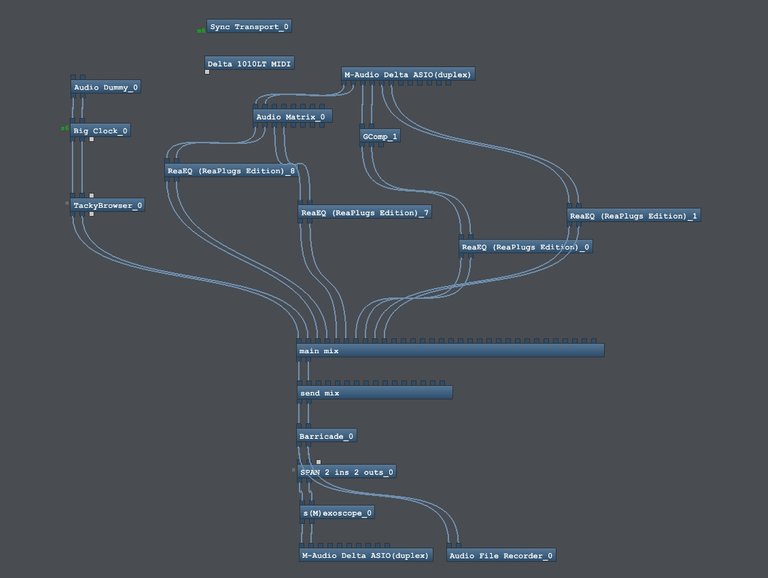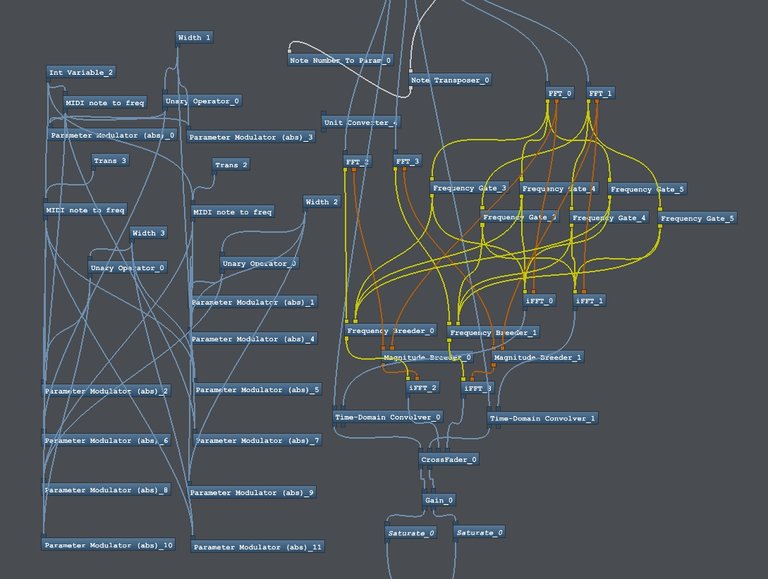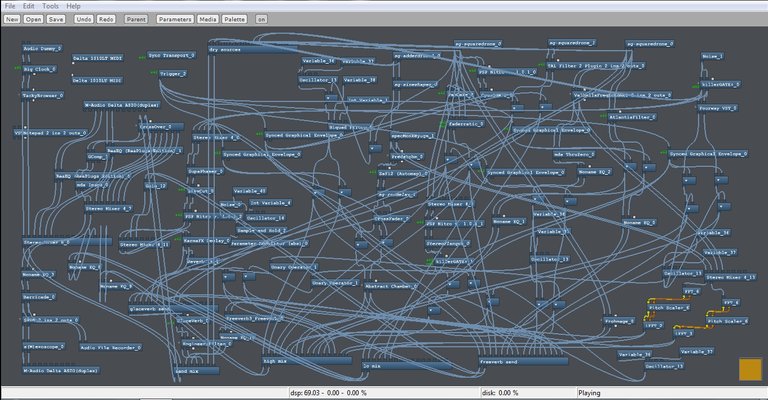This will be an ongoing series of articles, though I'm thinking it might only be every other week or so, since there's only so many obscure bits of audio software out there worth talking about, and in the case of things I may not be familiar with, I want to have some time to get into it.
I've decided to start with an old favorite of mine, Plogue Bidule (MacOS, Win). It's been around for quite some time, seems like I first downloaded an alpha version well over 10 years ago. It's still technically in beta, but I seldom come across a bug or crash (except under certain circumstances, see below). I gather there are more planned features, but as it is, it's more than usable, and has so many features I couldn't possibly cover them all here. Being a modular, multi-purpose kind of program though, there's always room for more. There is also room for improvement in ease-of-use type stuff, which I'll cover more later. I'm not sure how much of that will be addressed, but there's nothing that ruins it for me, so I don't really care either.
Beside lack of marketing, I think the main reason this program doesn't get much attention is that it's not the kind of thing everyone needs, or even wants. It's not really designed to be a "press record and go" type of DAW, and not everyone has a use for a modular DSP environment. For some that do, they might prefer something more like Reaktor. While there are definite similarities, I don't really see Bidule as the same kind of thing, but again, more on that later. Anyway, for some people, myself among them, I think Bidule is the kind of thing that fits into a particular niche quite well. That's the kind of thing I want to cover in this series of articles, and this seemed like a great place to start, especially since a new version has been released fairly recently (link below).
Alright then, let's do this.

Basic recording setup, with several inputs from an audio interface being mixed and recorded.
What Is Bidule?
At the most basic level, Bidule is a modular VST host/DAW. However, it is also a rather capable DSP environment, almost along the lines of SynthEdit or Reaktor, though not quite as deep... but also not as "high level" as, say, Reason, which is still modular, but doesn't really let you build stuff in the same way. The low level "bidules" (their word for modules) make me kind of imagine it as a sort of digital Radiophonic Workshop with modern conveniences such as VST plugins and instant recall via file management.
Everything connects with virtual cables, which are color-coded according to function (audio, MIDI, etc.). Connectors on the modules themselves show their function/label in the status bar when moused over, which is handy. The help file includes descriptions of all the included modules, and there are some good examples included with the program to give you an idea of what's possible.
Though it includes modules for basic sequencing, as well as recording and/or playing back audio and MIDI, none of this works like it does in a "standard" DAW. This is not intended as a criticism, it just isn't a standard DAW. On the other hand, it does have a "Sync Transport" module that works like the transport in any other DAW (play, stop, etc.), which includes tempo sync, and can be the sync source for any sync-able module or plugin. Bonus: a project can have multiple sync sources, and any module/plugin can sync to any of those sources. There are a multitude of possibilities here, but one way I've used it is to have different groups of modules set up for several different tracks in a live set, each with their own Sync Transport, so the whole show loads with one project file.
While we're talking about audio recording, there's one really cool feature I want to mention. The audio recorder modules have a "never overwrite files" setting, which has saved my ass when I'm messing around while sleep deprived more than once. It's a little thing, but very cool.
Something I just realized I forgot to mention: it can also be loaded into other hosts as a VST or VSTi plugin. Can't believe I forgot to mention that.
Plumbing the Depths
As mentioned above, Bidule doesn't let you go quite as deep as something like Reaktor, but you can build your own "groups", which are, well, groups of connected modules bundled together into a container, which can then be reused elsewhere as its own module. Plugins can be included in groups as well. For an example, you could bundle some oscillators, envlopes, and filters together to make your own synth, but you can't make your own versions of those filters or oscillators (well, you can combine stuff... but you get what I mean). Then again, it's not really the same type of program as Reaktor. It is perhaps more in the vein of Max/MSP or CSound, though again, not as deep.
All that said, there are some great low-level tools provided, including lots of MIDI stuff and a pretty wide range of FFT-processing bidules. There's some fun granular stuff, and some cool surprises like the Particle Arpeggiator (you just have to see it). Experimentalists and audio nerds will definitely love it.

"Innards" of a spectral processing group. Note the yellow & orange wires, for FFT frequency and magnitude, respectively.
I also think it's very good at working with external hardware. I've personally had a ton of fun using it to process sounds from my DIY modular setup and other external gear. It also supports Open Sound Control (OSC).
There are a few minor issues though. The biggest one for me is the parameter linking. It's a great feature, and usable, but sometimes getting it to respond how you want it to can be near impossible. Also, messing with the connections can be a pain, which is somewhat unavoidable in a program like this, though there are things that could be done to mitigate the problem. For example, I wish you could click on the connector itself to disconnect modules.
Another issue for me is technically a feature: Bidule is very strict about loading plugins. While this does help prevent plugin-caused issues running the program, it can be a bit of a pain at times, especially when you're waiting for it to scan everything on startup. It's only supposed to have to do once, and it does just scan new stuff when you add it, usually. Occasionally it seems to get confused, and scans everything again. These scans are the only time I've had a crash since several versions ago. The silver lining is that it always seems to pick up where it left off, as opposed to starting all over. Usually it just quits, but occasionally it hangs, and you have to do the old three-finger salute. Some of the plugins it has issues with give me no problems in other software, so I don't want to just delete them. Minor annoyance really.
Here's the Thing
All in all, for the right audience, I would highly recommend Bidule, despite some minor flaws. Though there are many modular audio programs out there, Bidule carves out a fine niche for itself in the space between the hardcore stuff like CSound or Max/MSP and "normal" DAWs. I also use SynthEdit and Flowstone, but programs like that or even Reaktor lack some of the hosting and performance-oriented features that Bidule has.
I haven't even really scratched the surface in this article, but there's just too much to really cover everything. Here's a link, so you can check it out for yourself:
https://www.plogue.com/products/bidule.html
You can also find some of the groups I've made at the DSP section of the FSA website:
https://www.fstateaudio.com/?page_id=236

Whoa.
Feel free to comment below, either about this article or Bidule itself, or something else you think would make a good subject for a future Obscure Audio Software article.
Very interesting. I am currently setting up a home studio, I am more of a Reason, Cubase, FL and Protools person. But I have been looking out for other flexible or not too rigid programmes I can experiment with. This is the first time i am hearing about this DAW and if it does this:
Then I think I will have to consider checking it out. I would love you to make an article on other DAWS, you could as well talk about why Protools is regarded as the industry's standard (only if you regard it too). I will follow you and also resteem this. Much love from Nigeria.
Hi, and thanks for the support! Bidule is definitely flexible, and yes, you can use it to make your own synths. If that's your main reason for being interested though, something like SynthEdit or Reaktor would give you more options (more filter types and stuff). However, as mentioned in the article, Bidule has the edge there in hosting/DAW features.
I am planning on doing some stuff about other DAWs, but I'm not a Protools user, so an article on that is unlikely, as I haven't really kept up with it over the years. In my opinion, it became the industry standard back when it was tied to hardware that allowed people to do stuff computers couldn't do on their own yet, and I think that added power and stability helped it stand out back then. From what I've seen of nwer versions, it seems like a perfectly fine program, but I think other similar DAWs have kept up or even surpassed it in terms of features. I can't really comment on the user experience, which is the main thing (other than price) that sets most of them apart from each other.
As far as other DAW-related content in the works, I'm working on some ideas for videos about using Reaper, which is my main DAW. First up will be a video on using it for dub-style infinite feedback loops. Thanks again, and nice to meet you!
Hi fstateaudio,
LEARN MORE: Join Curie on Discord chat and check the pinned notes (pushpin icon, upper right) for Curie Whitepaper, FAQ and most recent guidelines.
I am not really a tech girl, but i love playing around with DAWS and making some silly sounding music with it. I loved the article, even though i did not understand 70% of the jargons used. Thumps up man.
Thanks! I'm considering doing some tutorial-type stuff too, so if you have any specific subject you'd like to see covered, feel free to say so. No promises, but I've been into this stuff for 20+ years, so I've picked up a few tricks along the way, and I'm happy to share.
Nicely written article. I am really into the whole virtual modular sound design thing. There are some great apps on iPad now that do similar things like Audulus, AnalogKit and Jasuto. They also have the benefit of being portable and pretty cheap (if you have an ipad already anyway). Both Audulus and AnalogKit also have communities of users sharing their creations so you don't have to create everything totally from scratch
I've seen some really cool stuff for iPad, but I don't have one. I do have an Android tablet, and I may cover some stuff from that realm. Tbh though, I don't really use much of that stuff on a regular basis. As cool as I think it is that you can basically carry a studio around in your pocket, I can't stand touchscreen interfaces. What can I say, I'm old. :)
There is not a lot for Android. You should get Sunvox for sure, is an amazing modular thing Caustic3 is good one also
Right on. I have both of those, pretty cool stuff indeed. I've found a few other pretty cool things, but yeah, there's definitely more on iPad.
Congratulations @fstateaudio!
Your post was mentioned in the Steemit Hit Parade for newcomers in the following categories:
I also upvoted your post to increase its reward
If you like my work to promote newcomers and give them more visibility on Steemit, feel free to vote for my witness! You can do it here or use SteemConnect
@gaman you're on the @abusereports naughty list!
Bad Steemian! Bad!